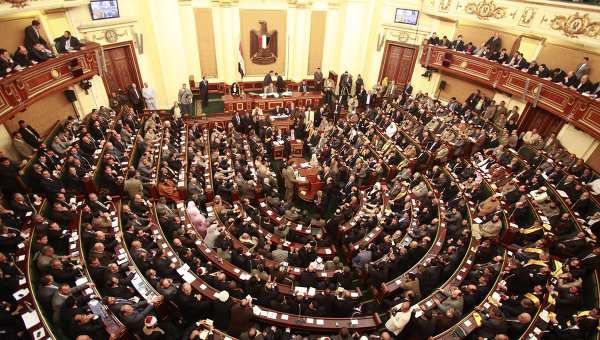The best book ever written is “1984 by George Orwell.
In this taut, nightmarishly-plausible tale of a future gone bad, the government monitors the thoughts and actions of all its citizens, indoctrinating them toward embracing the collective over the individual.
The ultimate crime, in this dystopian setting, is Thought Crime, which is defined as the propensity to come up with ideas that challenge the authority or the decisions of a higher power, such as the government. In effect, the mere thought of challenging authority is classified as a crime.
Egypt’s not at the point where thinking is classified as a crime. But only because we haven’t had any actual thinking in this country for a long time.
Besides, Egypt has a lot of challenges to keep it occupied for a while: aging and decrepit state institutions, impotent public services, the absence of a legal framework that both protects and empowers the individual (you can thank the perpetually renewable Emergency Laws for that; how can a nation live in a state of permanent emergency and what does that say about its government?) and endemic levels of corruption and intellectual dishonesty.
All these things are a spit in the ocean, compared to the challenge of getting people to reverse their long-standing commitment to one principle: mabatkalimsh fil deen wala fil siyassa (“I don’t speak about religion or politics ).
I’d love to know when this phrase originated and how it was able to permeate the consciousness of an entire nation, without a concerted government-sponsored advertising and propaganda effort. It’s almost enough to make me, a career advertising hack, question whether you actually need advertising to get people to do your bidding.
We live in a time when it’s hard to be proud of your country: natural disasters occur and even basic rescue services are nowhere to be seen. Government educational standards are at such a low level that 23-year-old teachers deem it acceptable to kick students in the stomach, an occurrence that doesn’t raise alarm bells unless the poor kid happens to die.
Basic healthcare is plagued by three problems: no compassion, no hygiene and no admission for anyone who can’t pay. Even the law, the one commodity that doesn’t require resources, only intellectual honesty and strict standards, is a shambles and a mire of systematic injustice.
No wonder most Egyptians cling to religion as the only means of salvation. Relief has got to be in the next life, because we sure aren’t getting it in this life.
How to get past all this? Well, I don’t do policy because that’s not my field. My field is advertising: finding the right words to communicate the right strategy that will get a group of people to buy into the right solution. Let’s see if I can earn my keep:
The government has become adept at convincing us we need to be realistic about what it can achieve, given our limited resources. In effect, it’s telling us not to expect too much from themselves either. No hope also means no disappointments!
This is the bigotry of lowered expectations: instead of inspiring, it suppresses, instead of offering hope, it lowers expectation, instead of promising prosperity, it only commits to staving off disaster. If we’re going to move ahead, we need to expect more from ourselves. And a whole lot more from the people who run our lives.
Critical thinking and dissent. I know it’s seen as disrespectful to argue with people in authority: parents, politicians, anyone older than you. However, without dissent, things don’t change. Without challenging the same old same old, we end up with the same old again. Without critical thinking, the skill to find weaknesses in any assertion and try and find a better way, we don’t move forward.
We need our laws back. Without laws, we have chaos. Without rights, we lack dignity. Without dignity, we lose initiative and foster apathy. We need rules that bind us and bind the people in charge, not exempts them. The perpetual application of the emergency law is an emergency in itself and if we’re ever to reclaim our self-respect.
Finally, we need original thought. We need thought that touches on everything and everyone, without shame, restriction or exceptions. There is an incredible amount of disinformation out there, which is what happens when a nation is led by bureaucrats, not experts in their respective fields. Bureaucrats who give birth to more bureaucrats and groom them to take over, when they’re no longer with us.
In short, what we need is punk rock! We need to kill our sacred cows. Rebel against the monarchy, knock down the pyramids, look to the future, not the past and above all, refuse to accept the shackles of the mind. If you have a thought, you owe it to yourself to find out how much it’s worth and why it works or doesn’t work. And you owe it to everyone to bet on a better future, not just accept an acceptable present.
To continue to just go with the flow and refuse to challenge the things you don’t approve of would be the real thought crime. And that would truly be unthinkable.
Mohammed Nassarwas kidnapped at birth and forced to work in advertising, in Cairo, New York and London. Today, his main concern is that archaeologists will one day stumble upon his desk, debate the value of his profession and judge him. Feel free to email him at [email protected].


